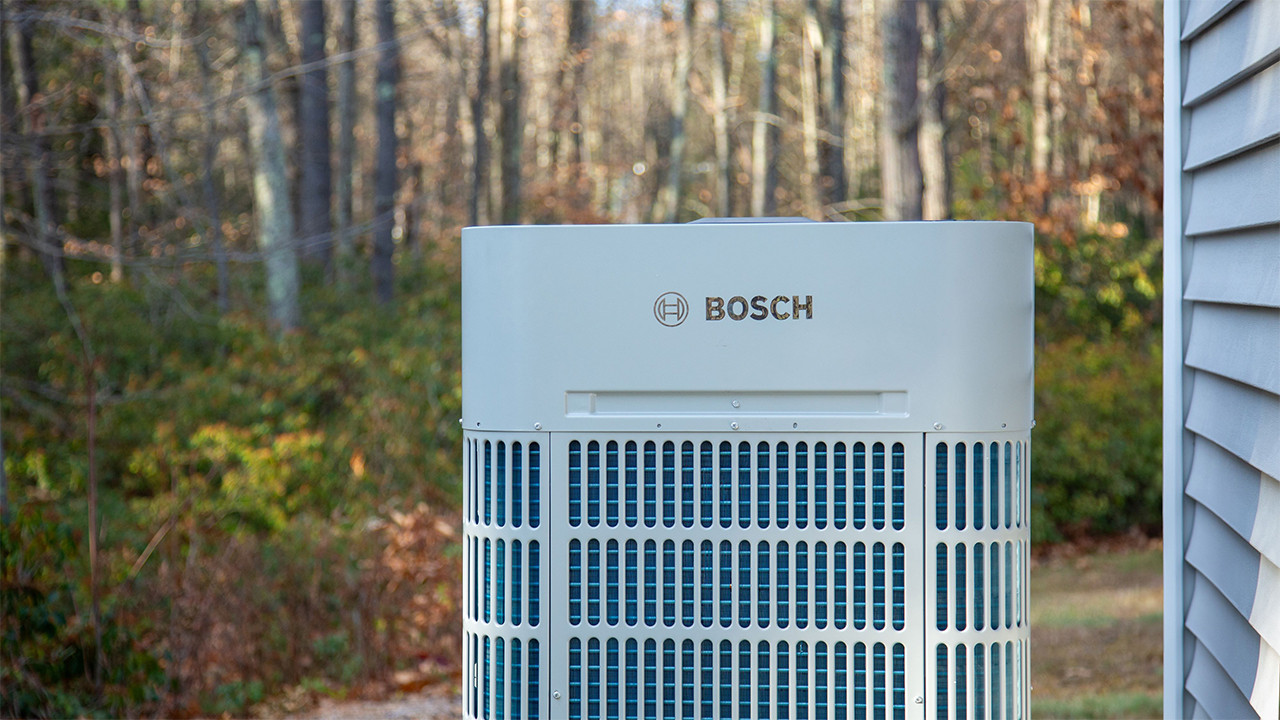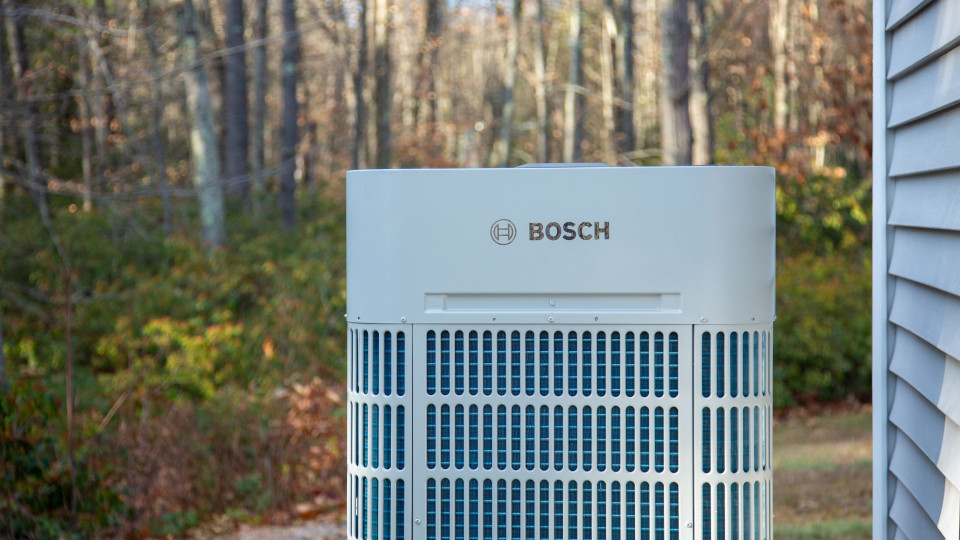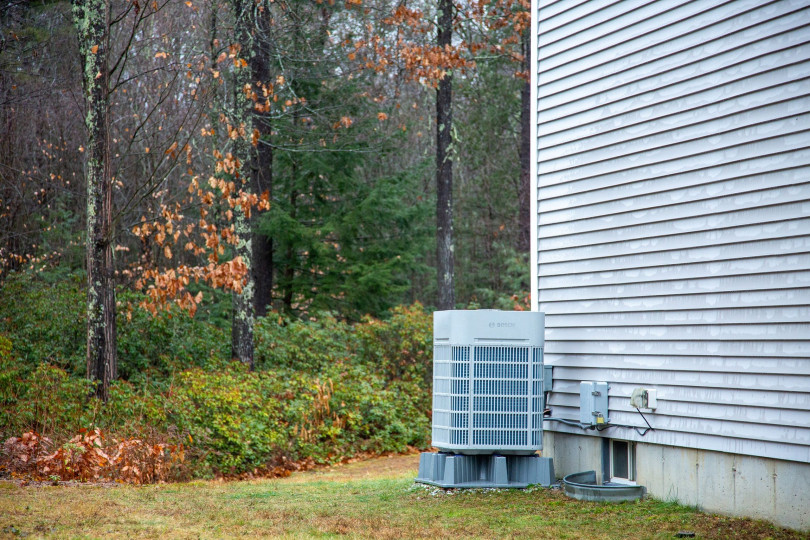Las Vegas, Nevada / Watertown, Massachusetts – From the frigid temperatures in Alaska to the sunny beaches of Florida, you can find almost all climate zones in the United States. This climate diversity challenges HVAC manufacturers when it comes to developing systems that can perform in all weather conditions. The region is aiming to steadily expand its renewable energy sector and accelerate the deployment of cold climate heat pump technology -- an efficient alternative to fuel-fired heating that also provides cooling.
“The barriers to using heat pumps for efficient heating and cooling in America have been substantially reduced thanks to advancements in technology. The conditions for electrifying homes in America are favorable, as already more than 17.7 million heat pumps are installed across the country and used for heating and cooling,” says Christian Fischer, the deputy chairman of the Bosch board of management who is responsible for the company’s Energy and Building Technology and Consumer Goods business sectors. The residential HVAC market is moving into a new era. Although there are still more AC-only units sold in the United States, the financial value of the heat pump market was already larger than for AC-only products in 2022 and is set to double by 2028, according to Bosch’s own market research. In 2020, almost half (45 percent) of new homes in the U.S. used electricity to heat, an increase of around 67 percent in comparison to 2000 (27 percent) . Today, more than half of energy use in homes goes toward heating and cooling . Home energy is a significant source of emissions in the United States. In an effort to reduce their personal carbon footprints , an increasing number of Americans are transitioning to electric energy.
At CES 2024, Bosch is presenting its IDS Ultra cold climate heat pump system, which is designed to operate in colder climate zones, like regions in the Northern U.S. Heat pumps, since they are electric, can help homeowners to reduce their carbon footprint. “To decarbonize homes in the U.S. and Canada, it is key to reduce our reliance on fossil fuels and conserve finite resources,” says Christian Fischer. “Our goal is to promote a more environmentally friendly lifestyle and we are proud to present state-of-the-art technology at CES 2024 which can contribute to tackling global warming,” he adds. “Bosch is making energy-efficient home heating and cooling accessible across almost all climate zones in the U.S., offering a promising step towards a cleaner energy future.”
Bosch survey: Homeowners care about cost and efficiency
A Bosch survey conducted in Canada and the U.S. found that awareness of heat pumps is near universal: 99 percent of homeowners have at least heard of heat pumps for heating and cooling. But the challenge in further adoption resides in the cold weather regions. More than a fifth of all respondents even currently own a heat pump, but heat pump ownership is very geographically uneven. The highest percentage of heat pump ownership is concentrated in the Southeast, in a region known for mild winters. In colder places like New England and the Upper Midwest, we see ownership rates 6 to 7 times lower. The few homeowners who do invest in a heat pump usually have to keep a backup system running, often powered by fossil fuels to take over when temperatures drop on cold winter days. In these regions, households tend to refrain from heat pumps due to the associated high energy costs and insufficient heating capacity in low ambient temperatures of traditional heat pumps. Switching to heat pumps comes with energy and cost saving advantages. This is good news for the nearly two-thirds of respondents to Bosch’s survey who cited cost and efficiency as their main concerns when it comes to heating and cooling their homes.
Bosch’s new heat pump fulfills almost all heating and cooling demands
Bosch’s latest heat pump technology now expands the reach of energy-efficient heating even into areas with extremely cold winters. “Our new IDS Ultra is the first Bosch air-to-air heat pump designed specifically for high efficiency heating in cold climates. The heat pump provides 100 percent heating capacity down to an outdoor temperature of 5° Fahrenheit (-15° Celsius) and will continue to operate even down to -13° Fahrenheit (-25° Celsius),” says Alexander Wuthnow, president and CEO of the Bosch Home Comfort Group in North America. “Thanks to advances in cold climate technology, our heat-pump provides heating even in sub-zero temperatures,” Wuthnow adds. The U.S. Department of Energy (DOE) confirmed that Bosch’s cold climate heat pump meets the requirements to progress from lab to field testing as part of the Residential Cold Climate Heat Pump Technology Challenge. The goal of the challenge is to advance the technology to allow consumers to make the switch to a cleaner energy future with less carbon emissions.
Consumer education is key to adoption of cold climate heat pumps
Heat pump technology has evolved to the point where reliable heating performance is now possible even in low temperatures. The next logical step is to make consumers aware of these advancements in energy-efficient home heating. According to Bosch research, there is significant opportunity to educate consumers on the full potential of heat pump technology as well as existing federal tax credits and state administered rebates available to help them make the transition. Professionals will play a key role when it comes to advising consumers, as over half of the respondents in Bosch’s survey reported using contractors and technicians as their main source of information.
1 https://www.energy.gov/clean-energy
2 Department of Energy (DOE): https://www.energy.gov/eere/buildings/articles/residential-cold-climate-heat-pump-technology-challenge-fact-sheet
3 U.S. Census Bureau (2020): https://elements.visualcapitalist.com/charted-home-heating-systems-in-the-u-s/
4 https://www.eia.gov/energyexplained/use-of-energy/homes.php
5 This presumes that renewable energy is used.
6 In a geographically stratified survey Bosch has asked 1,526 homeowners across the United States and Canada [Status: November 2023].
Bosch at CES 2024:
• PRESS CONFERENCE: Monday, January 8, 2024, from 9:00 to 9:45 a.m. (PST) with Dr. Tanja Rückert, member of the board of management of
Robert Bosch GmbH, and Mike Mansuetti, president of Bosch in North America, in Ballroom Banyan ABCD, Mandalay Bay Hotel, Las Vegas,
South Convention Center, Level 3, as well as livestreamed on the
Bosch Media Service.
• BOOTH: January 9 – 12, 2024, in the Central Hall, booth #17207.
• FOLLOW the Bosch CES 2024 highlights on X: #BoschCES.
• PANELS WITH BOSCH EXPERTS, Thursday, January 11, 2024:
“Elevate Your Space: Enhancing your Home with Smart Appliances”, 15:00 p.m. (local time), Venetian Hotel, Lando 4302, session with
Goncalo Costa, Vice President of Climate and Wellbeing North America.
“Our Newest Cyber Threat is AI and AI is Our Biggest Defense”,
14:00 p.m. (local time), Las Vegas Convention Center West / N258,
session with Dr. Zico Kolter, Chief Scientist of AI at Bosch.
“Future of Care: How Other Industries Shape Health”, 11:00 a.m.
(local time), Las Vegas Convention Center / North Wing, session with
Dr. Stefan Finkbeiner, General Manager at Bosch Sensortec.
Contact persons for press inquiries:
Dörthe Warnk
Phone: +49 172 1538714
E-mail: doerthe.warnk@bosch.com
Tim Wieland
Phone: +1 248 4100288
E-mail: tim.wieland@bosch.com
Mónika Hack
+36 70 510 5516
The Bosch Group is a leading global supplier of technology and services. It employs roughly 421,000 associates worldwide (as of December 31, 2022). The company generated sales of 88.2 billion euros in 2022. Its operations are divided into four business sectors: Mobility, Industrial Technology, Consumer Goods, and Energy and Building Technology. As a leading IoT provider, Bosch offers innovative solutions for smart homes, Industry 4.0, and connected mobility. Bosch is pursuing a vision of mobility that is sustainable, safe, and exciting. It uses
its expertise in sensor technology, software, and services, as well as its own IoT cloud, to offer its customers connected, cross-domain solutions from a single source. The Bosch Group’s strategic objective is to facilitate connected living with products and solutions that either contain artificial intelligence (AI) or have been developed or manufactured with its help. Bosch improves quality of life worldwide with products and services that are innovative and spark enthusiasm. In short, Bosch creates technology that is “Invented for life.” The Bosch Group comprises Robert Bosch GmbH and its roughly 470 subsidiary and regional companies in over 60 countries. Including sales and service partners, Bosch’s global manufacturing, engineering, and sales network covers nearly every country in the world. The basis for the company’s future growth is its innovative strength. At 136 locations across the globe, Bosch employs some 85,500 associates in research and development, of which nearly 44,000 are software engineers.
The company was set up in Stuttgart in 1886 by Robert Bosch (1861–1942) as “Workshop for Precision Mechanics and Electrical Engineering.” The special ownership structure of Robert Bosch GmbH guarantees the entrepreneurial freedom of the Bosch Group, making it possible for the company to plan over the long term and to undertake significant upfront investments in the safeguarding of its future. Ninety-four percent of the share capital of Robert Bosch GmbH is held by Robert Bosch Stiftung GmbH, a charitable foundation. The remaining shares are held by Robert Bosch GmbH and by a corporation owned by the Bosch family. The majority
of voting rights are held by Robert Bosch Industrietreuhand KG, an industrial trust. The entrepreneurial ownership functions are carried out by the trust.
Additional information is available online at www.bosch.hu, iot.boschblog.hu, www.bosch.com, www.iot.bosch.com, www.bosch-press.com, www.twitter.com/BoschPresse





